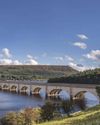
Flooding is in the news again. Sheffield’s rivers burst their banks and left people stranded at the Meadowhall shopping complex, and devastated people’s homes in the South Yorkshire village of Fishlake, near Doncaster. Closer to home the River Derwent became a torrent and tragically took the life of former High Sheriff Annie Hall, also causing flooding in Matlock and Belper. Further autumn flooding affected people’s homes, land and lives throughout Yorkshire and the Midlands.
Whenever such high profile flooding hits the news, the predictable baying for more active river management begins – ‘dredge the river’, ‘straighten the rivers’, ‘build walls’, ‘get the water out to sea as quickly as possible’.
But unfortunately, experience over decades has shown us that such tactics just do not work – if anything they tend to make things worse. Move the water quickly, yes, but that means that more tends to reach ‘bottlenecks’ all at the same time, and those bottlenecks are often where rivers flow through towns and cities, where people live and form communities and where the floods can do the most damage and cause the most misery.
More recent experience is teaching us that a more effective tool in our flood defence armoury is to slow down the rate at which water enters our rivers and makes its way through the river system. This can be achieved by using techniques known as Natural Flood Management (NFM), the collective aim being to ‘slow the flow’. It is a different way of thinking about how we manage our water.
It is an obvious point, but floods happen when a lot of rain falls all at once. So if we are going to manage that water better, then the place where most of it falls is a good place to start: and that is up on the top of the moors. Seventy per cent of our drinking water, for instance, comes from these hills.
Bu hikaye Derbyshire Life dergisinin February 2020 sayısından alınmıştır.
Start your 7-day Magzter GOLD free trial to access thousands of curated premium stories, and 9,000+ magazines and newspapers.
Already a subscriber ? Giriş Yap
Bu hikaye Derbyshire Life dergisinin February 2020 sayısından alınmıştır.
Start your 7-day Magzter GOLD free trial to access thousands of curated premium stories, and 9,000+ magazines and newspapers.
Already a subscriber? Giriş Yap

Can Plants Hear?
In the latest in his series on the intelligence of plants, Martyn Baguley analyses whether they have the ability to hear

Peak National Park and Ride
Andrew Griffihs asks what the future holds for transport in the Peak National Park and talks to Julian Glover about his Landscapes Review

Doubly thankful
Mike Smith explores the village of Bradbourne, which has a particularly poignant tale to tell

What lies beneath
Exploring the hidden depths of Ladybower Reservoir, which conceals secrets of a fascinating past

Battle for our birds
Paul Hobson analyses our complex relationship with birds of prey and how these fascinating birds are fairing in Derbyshire

Explore the Peak Forest
A walk through autumn fields and forests with far reaching views enriched by snippets of mystery, romance and the area’s industrial past

Pictures to transport you
Chesterfield photographer David Keep continues his photographic journey, this time recalling his favourite landscape images from around the world

The magic of Christmas
Ideas for days out, gifts and where to find local produce in Derbyshire this festive season

PENNY for the Guy
We take a look at Derbyshire’s bonfire tradtions through history

From hardship came happiness
Pat Ashworth speaks with Chesterfield based retired Colonel John Doody about his inspiring life, from a diffiult childhood to overcoming diversity and finding happiness